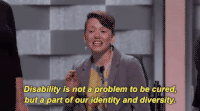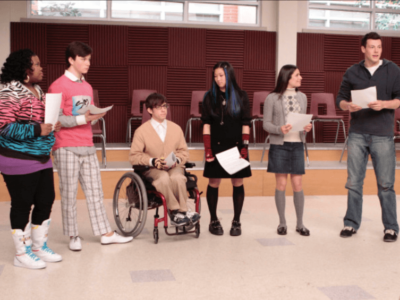Think about what it takes for you to get to class each day. How long does it take you to get ready and to your seat? What path do you take? Are there stairs? An elevator? What about a ramp? Is the door to the building heavy? For a lot of students, those questions may seem out there and even a little ridiculous. But for students with disabilities from physical, psychological or cognitive (or any combination thereof), these can mean the difference between making it to class or not. And that doesn’t even begin to cover the challenges that the academics themselves can present. Most, if not all, colleges have resource centers devoted to helping students with all types of disabilities, but many obstacles still need removing in order to make college truly accessible to everyone.
What it’s Like For Students With Disabilities
I’m going to come straight out and say it: Being a disabled student is hard. For starters, living on your own in a new place, balancing harder academics with often weird social experiences takes a toll on all students. But for many disabled students, it’s possibly the first time they ever have to advocate for themselves and their needed accommodations.
I feel lucky that my mom made me speak at all of my 504 (disability accommodation) meetings in high school. That gave me the practice I needed to explain to teachers where I struggled and how they could help. But some students didn’t have the same experience. “[Sometimes] I found it hard to ask for the accommodations I needed out of the fear that my needs would be ignored or that I would be looked down upon,” said 2017 Landmark College graduate Lizzy Hubbard. “I also had a hard time asking questions in classes because I felt like I was asking stupid questions.”
Even with accommodations considered, it doesn’t necessarily make a difference. Often times, it’s the other support resources provided that really help. “I struggled a lot in high school, so to start I went to a specialized school for students with learning disabilities, and spent a year there, which really helped,” said Connor Murphy, a Landmark College senior on a gap year. Resource centers can truly make or break the college experience for disabled students.
Beyond that, the social aspect, one that can become very difficult for disabled students, makes up a huge part of college. Whether it’s having the physical capability to attend a club meeting, talking about the difficulty of a certain class or even socializing in general—having a disability can add an extra level of challenge to things most students take for granted. “People think you have it easier because you get extra time. The fact is, they don’t actually understand why you have that extra time,” said Murphy. “We have to work twice as hard as they do.” I cannot even begin to count the number of times that I have had to explain to someone why, no, I’m not lucky that I get to use my laptop to type an essay for a test.
There’s also the common misperception that disabled people can’t succeed to the same degree, they don’t belong on a “normal” college campus or are just there out of pity/to fill a quota. That creates a toxic environment that endangers the success of disabled students. “People tend to talk down to disabled people and force help on them without looking at their actual intelligence,” added Hubbard.
This type of condescending behavior perpetuates the stereotype that disabled people are “less than.” But it also oppresses them by taking away their autonomy and making them thank abled-bodied individuals for “help” that’s often unnecessary and sometimes inconvenient. “I’ve had way too many situations where people act as though they know me and my body better than I do. Not only is it rude, but it’s incredibly invalidating,” said 2017 Arcadia University graduate Jenna Meyer. “It’s hard enough for us to ask for things we need, so don’t shut someone down when they ask for something.”
Resources for Disabled Students
Almost every college has some type of resource in place for disabled students. Some schools may just have an office or a support center. But at others, the network is much bigger and further reaching. Most attention of these centers goes to supporting students academically, by helping arrange accommodations, hosting sessions on skills like how to take notes efficiently or study well and offering extended time on tests.
However, other places go further. While it’s more likely to find these services at specialized schools, you can often find them at a number of public schools and a handful of private ones. For example, most schools will help students create letters listing their accommodations to share with professors, but others will go beyond that and help implement those plans, which can range from scheduling regular tutoring sessions or offering an alternative testing environment.
Schools like Beacon College, Hofstra University and Marist College offer specialists who work one-on-one with students to help them succeed. Some schools, such as Northeastern, University of Denver and Texas University “employ” volunteer notetakers for students, while others such as University of Southern California, Xavier University and West Virginia Wesleyan College offer assistive technology for notes (and other purposes). Last but not least, schools such as the University of Connecticut, Adelphi University and Dowling College have gone above and beyond to assure that their campuses are physically accessible to all students by establishing modified sidewalks, adding ramps and elevators to buildings and creating handicap parking spots in all student lots.
How to be an Ally to Someone with a Disability

Listen in order to understand someone’s experience. “To be an ally, the best thing other students can do is actually take the time to befriend us [disabled students],” said Murphy. Becoming friends with (or even just friendly towards) disabled students not only helps allies to better understand how to help the community, but also helps students who may struggle to socialize.
Once you’ve heard someone’s story, you need to keep it in mind and often, alter your perspective. “Listen and don’t assume! It’s so important to give the [disabled] individual the floor if they’re going to talk to you about their disability or what they need,” said 2017 Lock Haven University graduate Kathryn Biddle. Even if something may seem easy for you, it could present a significant challenge for a friend with a disability. “People need to know that disabled people tend to know their bodies very well. If we say we need something or we need to do something, please respect us,” said Meyer.
But most of all, keep your mind and heart open. If you’re ever unsure or curious, ask—it’s better to be safe than sorry. Never make assumptions about someone’s ability. Not everyone that’s disabled looks it. Use your voice to support your disabled friends and stand with them in the fight for justice and equal access. “Non-disabled people need to stand up against the stigma and help the world see that disability doesn’t mean someone can’t make it in college,” said Hubbard. Support your friends with disabilities At the end of the day, your friendship matters the most.



















